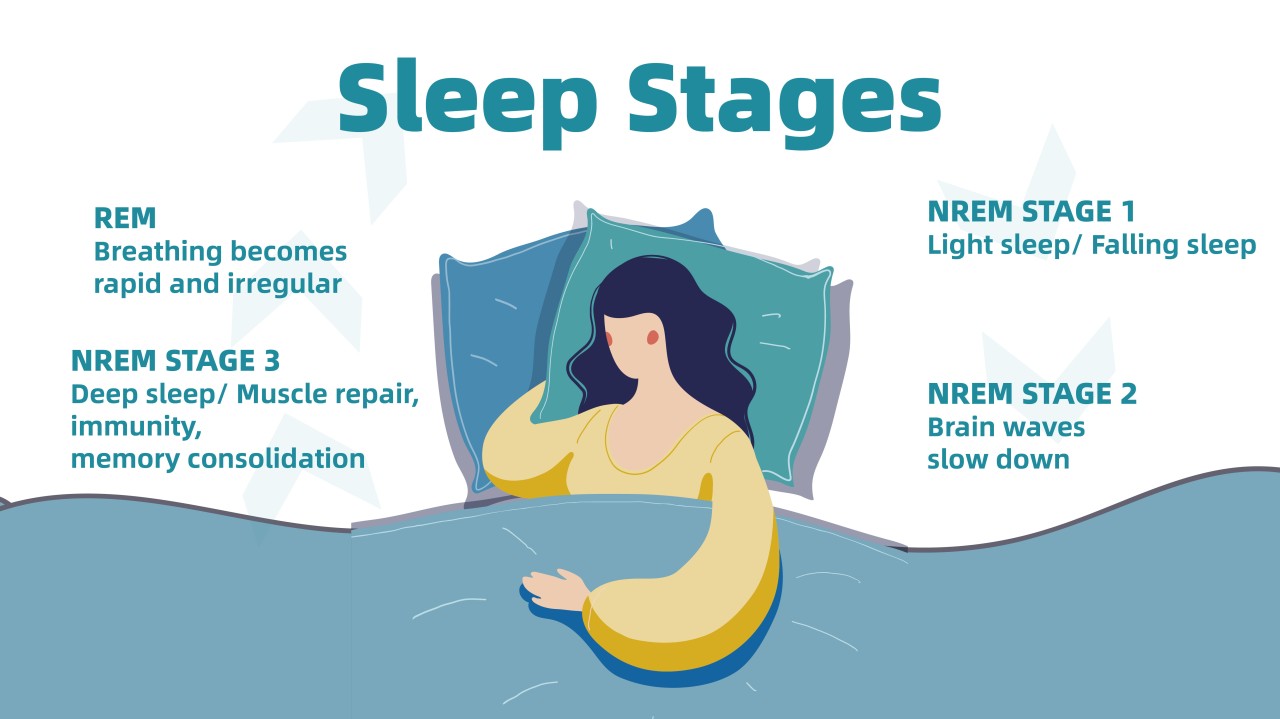Do you know how important peaceful sleep is for overall health and productivity? Well, it is important as the air we breathe all the time! Quality sleep can make a difference in both your physical and mental health. It's the ultimate reset button, leaving you feeling recharged and focused. That peaceful sleep is more than just relaxation; it is an important investment in your overall health and performance!
Just as good nutrition and regular exercise are the foundation of good health, sleep is essential to a person's physical and mental well-being. We spend about a third of our lives sleeping. Sleep is an important and involuntary process without which we cannot function effectively. It is as essential to our bodies as eating, drinking and breathing and is vital to our physical and mental health. Sleep helps not only the body but also the brain to repair and revitalize.
What are the 4 stages of human sleep?
During sleep, we can process information, consolidate memories, and perform a variety of maintenance tasks that allow us to function during the day.

As you sleep, your brain goes through four stages of sleep. The first three are classified as non-rapid eye movement (NREM) sleep, also called quiet sleep. The fourth stage is rapid eye movement (REM) sleep, also known as active sleep. Each sleep stage plays a unique role in maintaining your brain's overall cognitive performance.
- NREM Stage 1
According to Healthline.com, Stage N1 is the transition from wakefulness to sleep, typically lasting a few minutes. It is the lightest stage, with slow and rolling eye movements, slowing heartbeat and breathing, relaxation of muscles, and low amplitude mixed frequencies waves in the theta range (4 to 7 Hz). Patients usually don't perceive being asleep.
- NREM Stage N2
The next stage of non-REM sleep, which accounts for the majority of total sleep time, is lighter and easier to wake up from. It involves slowing down heartbeat and breathing, no eye movements, and dropping body temperature. Sleep spindles and K-complexes are distinct brain wave features that appear for the first time.

Photo Credit: Linkedin/BMC
- NREM Stage N3
The final stage of non-REM sleep, known as slow-wave or delta sleep, is the deepest and most important. It involves difficult arousal, slow heartbeat and breathing, no eye movements, full relaxation, delta brain waves, tissue repair, growth, cell regeneration, and strengthening of the immune system.
- REM Stage R
REM sleep is divided into two phases: phasic and tonic. Phasic sleep involves rapid eye movements, while tonic sleep doesn't. Stage R, the primary "dreaming" stage, occurs 90 minutes after falling asleep and lasts about 10 minutes. It increases with each cycle, with the final cycle lasting 30-60 minutes. During this stage, eye movements become rapid, breathing and heart rate increase, muscles become paralyzed, but twitches may occur, and brain activity increases. Sleepers cycle through these stages every 90 minutes.
Why is sleep important for physical development?
Inadequate sleep can increase the risk of chronic health problems and negatively impact cognitive abilities, work performance, learning, and social interactions. It affects the heart, circulatory system, metabolism, respiratory system, and immune system, with different immune cells working harder during different sleep times. Insufficient sleep may increase the likelihood of colds and other infections, as the immune system becomes more active at different times of the day.
-
Heart and circulatory system
Sleeping and non-REM sleep lead to decreased blood pressure and heart rate, as the parasympathetic system controls the body. However, during REM sleep and waking, the sympathetic system activates, increasing heart rate and blood pressure to normal levels. This sudden increase can cause angina, chest pain, and heart attacks. Insufficient sleep or frequent nighttime wakefulness can increase the risk of coronary heart disease, high blood pressure, obesity, and stroke.
_1706035422.jpg)
-
Metabolism
Circadian clocks in the liver, fat, and muscle influence the way the body handles fat. These clocks ensure that the liver is prepared to digest fats at specific times. Eating at unusual times can have an impact on the way the body processes fat. Inadequate quality sleep has been linked to elevated hunger hormones (leptin and ghrelin), decreased insulin responsiveness, increased food intake (particularly fatty, sweet, and salty foods), decreased physical activity, and an increased risk of metabolic syndrome, all of which contribute to overweight and obesity.
-
Respiratory and immune systems
During sleep, breathing becomes shallower and less frequent, resulting in lower oxygen intake. This can be difficult for people who have health issues such as asthma or chronic obstructive pulmonary disease (COPD), as their symptoms worsen during early morning sleep. Sleep affects many aspects of the immune system, with specific immune cells working harder while sleeping. Inadequate sleep may increase vulnerability to colds and infections due to a weakened immune system.
How Does Lack of Sleep Affect Mental Health?
Sleep and mental health are strongly connected. When one is impacted, the other is also affected. The lack of sleep can lead to various mental health issues, such as depression and anxiety. During sleep, our brain performs essential cognitive processes like memory consolidation and neural communication. If we don't get enough sleep, our brains cannot function properly during the day. Poor sleep can have negative effects on different mental health conditions, including common disorders. Let's take a look at how these conditions are influenced by inadequate sleep:
-
Depression
Depression is influenced by factors like prolonged stress and hormonal changes, which can interfere with sleep, a bidirectional relationship. Depressed individuals are more likely to experience insomnia, while those with disrupted sleep are more likely to suffer from depression. While proper sleep alone cannot cure depression, a healthier lifestyle can significantly improve symptoms.

- Anxiety
Anxiety and sleep are closely linked, creating a vicious cycle where one suffers and the other suffers. Anxiety disorders are often linked to insomnia, and some may require medication to improve sleep. However, lifestyle changes like consistent bedtime, avoiding phones in bed, avoiding alcohol and caffeine, and managing sleep-related thoughts can help alleviate symptoms and improve sleep quality. According to experts, these changes can help reduce anxiety and improve overall well-being.
- Sleep Improves Memory
Sleep is crucial for memory processing, as it allows the mind to process stimuli and strengthens neural connections. Research shows that electrophysiological, neurochemical, and genetic mechanisms during the slow-wave sleep stage are key to learning new information and using memory effectively. Therefore, sleep quality is essential for effective memory formation.
In Bottom line
Prioritising sufficient sleep is critical for important functions such as memory consolidation and cell repair. A well-rested mind is sharper, more creative, and more focused, resulting in increased daily productivity. Adequate sleep strengthens the immune system, lowers the risk of illness, and improves mental health, mood regulation, and emotional resilience. Maintaining consistent sleep patterns is essential for overall physical and mental health. Finally, ensuring good-quality sleep has a significant impact on our overall health, with positive consequences for many aspects of our daily lives.
ⒸCopyright 2024. All Rights Reserved Powered by Vygr Media.



















